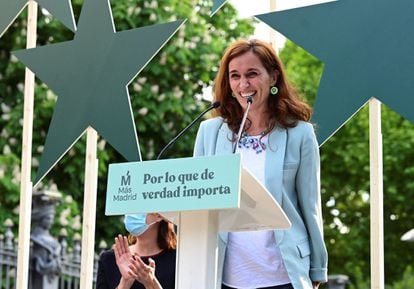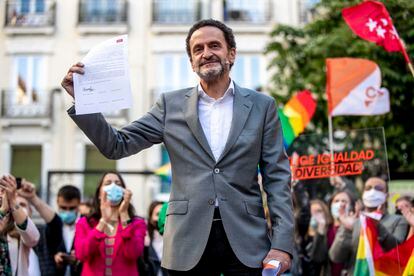Madrid voters cast their ballots in high-stakes election
Early turnout figures suggest that an unusually acrimonious campaign filled with rhetoric about defending ‘democracy’ and ‘freedom’ has galvanized voters of all political stripes into action
/cloudfront-eu-central-1.images.arcpublishing.com/prisa/P5VZ4F7GLC4C5YCQIGQO3RLS3M.jpg)
Madrileños flocked to the polls on Tuesday morning in a regional election that’s being widely viewed as a test with national repercussions in an increasingly polarized country.
Early turnout figures suggested that an unusually acrimonious campaign has galvanized voters of all political stripes into action. Turnout by 7pm was at 69.14% – that is up 11 points compared to the last election, which was held in 2019. The record high was seen in 1995, with 70.3% turnout. At 1pm, turnout was at 28.4%, up from the 26.2% seen at the same time at the election two years ago.
The vote comes two years ahead of schedule following a decision to hold a snap election taken by Madrid premier Isabel Díaz Ayuso, who is seeking to reinforce her hold over a political and economic powerhouse that’s been governed by her conservative Popular Party (PP) party for the last 26 years.
A lot is at stake for all political parties involved, and the campaign has been marked by epic rhetoric framing the ballot as a choice between “freedom and communism” for some, and between “democracy and fascism” for others. In a further sign of the current political climate, several candidates received death threats in the mail, forcing the government to step up security even as the campaign descended into a toxic exchange of accusations.
Following an intense two weeks, interest in the snap election is running high. A total of 5,112,658 residents are eligible to vote for the 136 representatives who will sit in the regional assembly for the next two years. Madrid authorities noted that this is a new voter record for a regional election, and said there were 259,411 requests for mail-in voting, representing a 41% rise from 2019. According to the regional government, there have been requests for mail-in votes from 121 countries, mostly the United Kingdom (4,464), Germany (3,972), France (3,021) and the United States (2,752).
The coronavirus pandemic is also having an effect on the election in a region with a 14-day incidence rate significantly above the government’s danger threshold. Voting stations will remain open to the public between 9am and 8pm, and people who have an active coronavirus infection, or suspect they may have, have been asked to go vote as late in the evening as possible. The regional government has purchased more than 55,000 liters of hand sanitizer, nearly five million face masks and two million gloves for distribution at voting booths.
The right: all or nothing

For Díaz Ayuso, it’s an all-or-nothing gamble: if she were to win the most votes and seats yet lose the government to a leftist coalition, it would represent a major blow not just for her but also for the PP’s national president Pablo Casado, who is hoping for a success in Madrid that will lead to a wider victory at the next national election, scheduled for 2023.
On Sunday – May 2, a regional holiday celebrating Madrid’s uprising against Napoleon’s occupation forces in the early 1800s – Díaz Ayuso resorted to history to frame her own bid for re-election. “We continue to defend the same cause: Spain and freedom,” she told the assembled crowd. “Madrid’s problem is Pedro Sánchez,” she added, alluding to Spain’s Socialist Party (PSOE) prime minister.

If the PP holds on to power but requires additional backing to form a majority, it will become beholden to the far-right party Vox. The ultranationalist group has so far been providing support to some local and regional conservative governments in Spain without demanding to be made an official governing partner. But this strategy could end on Tuesday.
Vox brought its campaign to a close in Colón square, with party leader Santiago Abascal there to support Madrid candidate Rocío Monasterio. Abascal said that his party’s goal was to “prevent the social-communist assault on the Madrid region,” although he failed to specify whether he would be demanding regional Cabinet posts in exchange for supporting the PP.
The left: getting out the vote

The left has been campaigning hard to regain control of Madrid, which is the Spanish region with the third-largest population and the biggest budget. To do so, it is hoping to mobilize voters in large numbers on Tuesday. Prime Minister Sánchez attended a Socialist Party (PSOE) campaign rally in Entrevías, one of Madrid’s poorest districts, where he warned against the dangers of granting victory to “hate and intolerance.”
The PSOE is hoping that its Madrid candidate, the veteran politician Ángel Gabilondo, will help the left take back power in a region where it keeps hitting a wall. Gabilondo warned that “if we don’t go [vote], we will lose it all and it will be too late.” The 72-year-old will be making his third attempt at becoming the Madrid premier after failing in 2015 and 2019.

Meanwhile, the head of Unidas Podemos, Pablo Iglesias, quit his job as deputy prime minister in the national coalition government in order to run in the Madrid election and fight “the enemies of democracy.” He has compared Díaz Ayuso with former US president Donald Trump and with Brazil’s Jair Bolsonaro. “What do you think will happen if they lose? Haven’t you seen it at the Capitol?” he said, alluding to the January 6 storming of the US Capitol by a mob of Trump supporters attempting to halt the certification of Joe Biden as the new president.
The left’s attempt at unity is further hampered by the surge of a new party, Más Madrid – an offshoot of Podemos led by one of the latter party’s co-founders, Iñigo Errejón – that is attracting a large following among young and female voters. Más Madrid candidate Mónica García has insisted on the idea of a left united against a right that “views freedom as the freedom to walk all over people and ignore society.” But she has also refused to run in coalition with Iglesias, stating that “we women are tired of doing the dirty work and then being asked to step aside at historical moments.”
/cloudfront-eu-central-1.images.arcpublishing.com/prisa/JO4WDETPEVMUIHCLTZVUGNKONI.JPG)
The center: fighting for survival
The Madrid election will also decide the future of Spain’s political center. If Ciudadanos (Citizens) does not attract at least five percent of the vote, it will be left out of the regional parliament and will not be able to play the role of kingmaker.
After starting out as a liberal party that made great strides in a short space of time – it became the fourth-largest force in Spanish parliament at the 2015 national election, won the most votes at the 2017 Catalan election, and has been the junior partner in the Madrid government for the last two years – Ciudadanos lost significant support when it veered to the right in a bid to compete with the PP for the center-right space.

With the party’s entire survival on the line, its candidate Edmundo Bal on Sunday reached out one final time to “those who believe in social harmony and dialogue.” Despite presenting himself as a moderate alternative, Bal has already made a choice, stating that he would only support a government by Díaz Ayuso.
With additional reporting by Juana Viúdez.
English version by Susana Urra.
/cloudfront-eu-central-1.images.arcpublishing.com/prisa/M35PEWNFZJAQZO5ULRDKXC4CDQ.jpg)
/cloudfront-eu-central-1.images.arcpublishing.com/prisa/2U3SVELLVZHJRAXPXI6IRV75UE.jpg)










































